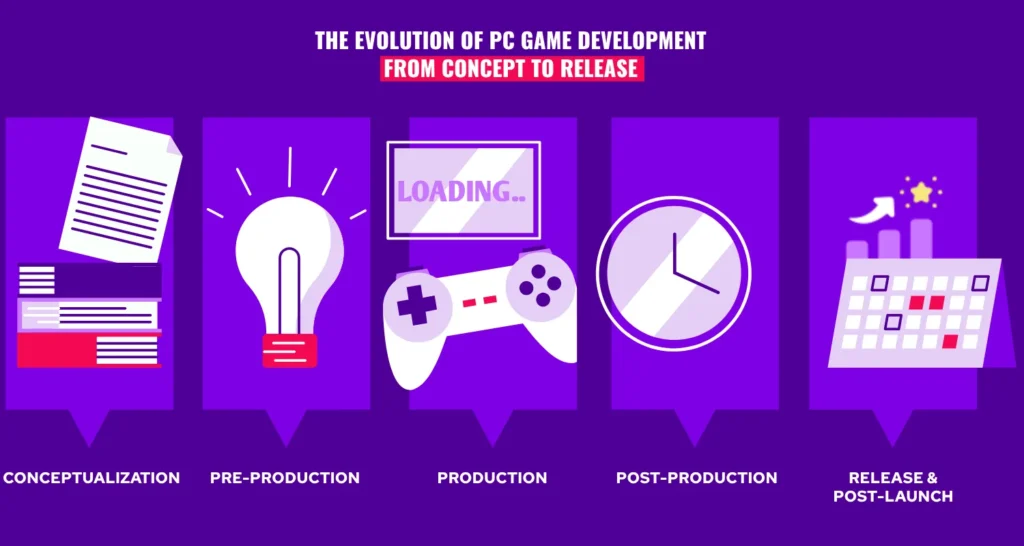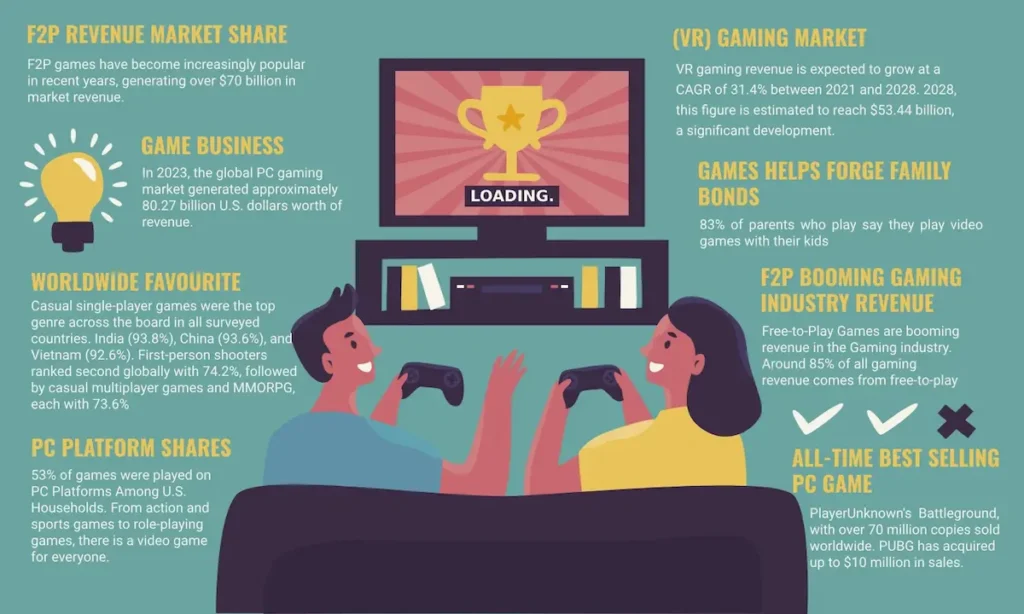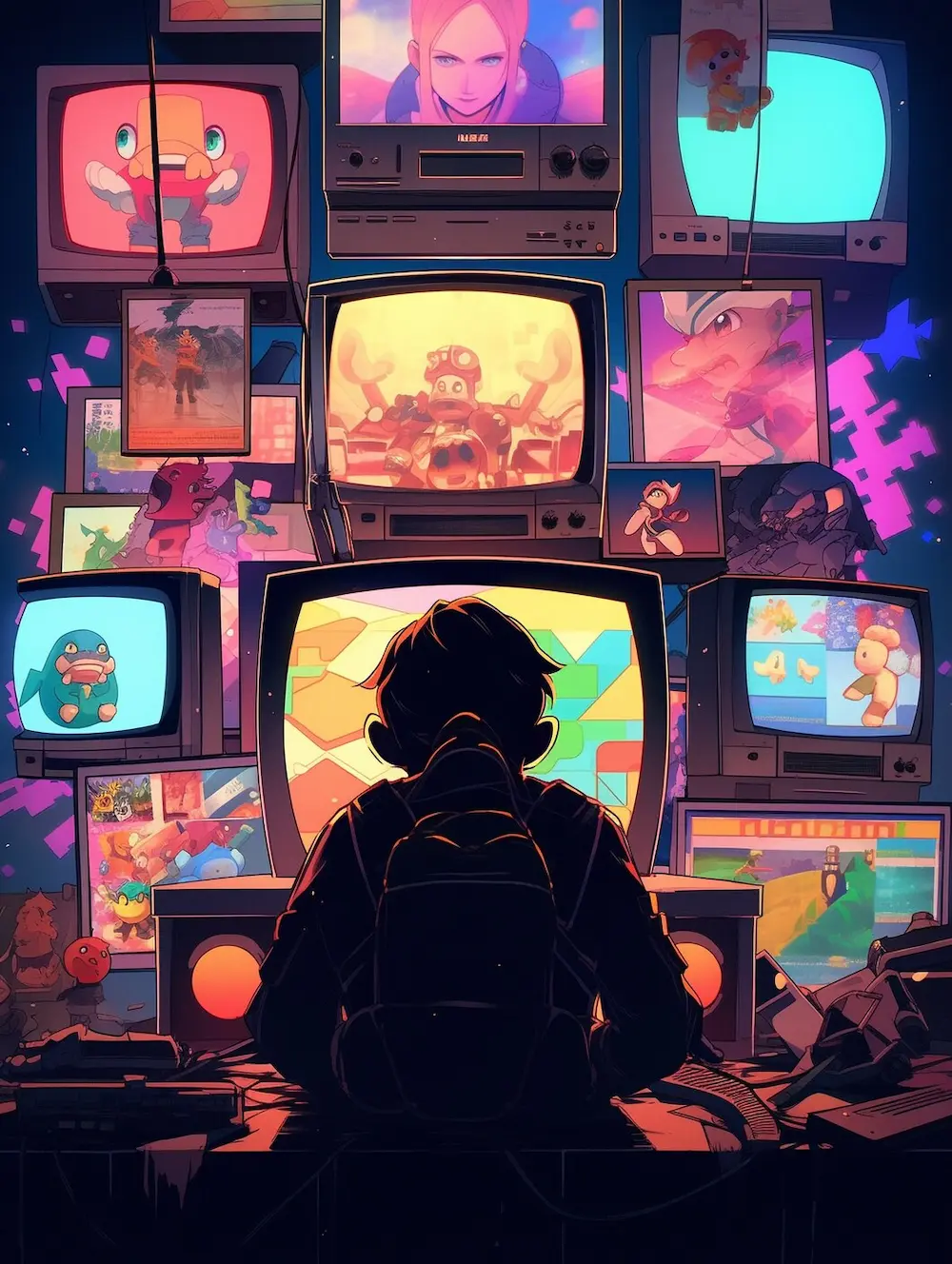The world of PC game development has undergone a dramatic transformation over the past few decades. What started as simple, pixelated adventures has evolved into highly immersive, visually stunning experiences that captivate millions of players worldwide. As the gaming industry continues to grow, understanding the intricate process behind creating a successful PC game is crucial for developers, enthusiasts, and businesses alike. In this blog post, we’ll explore the evolution of PC game development, from the initial concept to the final release, shedding light on the various stages and strategies that ensure a game’s success in the competitive market.
PC game development has seen significant advancements in technology and design, driven by the demand for more engaging and visually stunning games. According to a recent report by Statista, the global games market is expected to generate revenues of $218.7 billion in 2024, with PC gaming accounting for a substantial portion of this growth. The rise of indie game development, fueled by accessible development tools like Unreal Engine and Unity, has democratized the industry, allowing smaller studios to create innovative and unique games.
Emerging trends such as integrating artificial intelligence (AI) and machine learning in game development are set to revolutionize the gaming experience. AI is being used to create more realistic non-player characters (NPCs) and procedurally generated content, enhancing the depth and replayability of games. Additionally, the increasing popularity of virtual reality (VR) and augmented reality (AR) games is opening new avenues for immersive gameplay experiences.
The future of PC game development is poised for further innovation with advancements in cloud gaming, which promises to make high-quality games more accessible without expensive hardware. The continued growth of esports and live-streaming platforms also influences game design, encouraging developers to create competitive and spectator-friendly games.
In the following sections, we will delve into the detailed PC game development service process, exploring each stage from conceptualization to release and highlighting the key factors contributing to creating a successful game.

Conceptualization
The conceptualization phase is the bedrock of any successful PC game’s development and subsequent launch. It’s where ideas take shape, where imagination meets feasibility, and where the seeds of what could be the next big hit are sown. This stage is about harnessing creativity, conducting thorough research, and laying down a clear vision for the game. Here’s how we at StudioKrew approach this crucial phase.
Idea Generation
Every great game starts with a spark of inspiration. This could come from various sources—a unique gameplay mechanic, an intriguing storyline, or a striking visual style. During this stage, brainstorming sessions are vital. Our team gathers to discuss and explore different ideas, pushing the boundaries of creativity. We ask ourselves critical questions: What kind of game do we want to create? What experience do we want to deliver to players?
Market Research
Once we have a few promising ideas, it’s time to validate them through market research. Understanding the current market trends, player preferences, and competitor offerings is essential to ensure our game will resonate with the target audience. We analyze successful games in the genre, identify gaps in the market, and look for opportunities to innovate. Tools like surveys, focus groups, and online forums provide invaluable insights that help refine our initial concepts.

Game Design Document (GDD)
With a solid idea backed by research, the next step is to create a Game Design Document (GDD). This document serves as the blueprint for the entire development process. It outlines every aspect of the game, from the core gameplay mechanics and storyline to the art style and sound design. At StudioKrew, we believe a comprehensive GDD is essential for keeping the development team aligned and focused on the project’s goals.
The GDD includes:
- Game Overview: A brief description of the game’s concept, genre, and target audience.
- Gameplay Mechanics: Detailed descriptions of the core gameplay loops, controls, and user interface.
- Story and Characters: Backgrounds of the game world, plot progression, and character bios.
- Visual and Audio Style: Art direction, graphical style, and audio elements that define the game’s aesthetic.
Setting the Vision
Conceptualization is not just about what the game will be but also about what it stands for. We establish a clear vision that encapsulates the game’s essence and purpose. This vision guides every decision made throughout the development phase, ensuring consistency and coherence. It’s the foundation upon which all subsequent stages are built, providing a clear direction for the team.
Fact: According to a survey by the Entertainment Software Association, 70% of gamers cite stories and characters as significant factors in their enjoyment of a game. This statistic underscores the importance of a well-thought-out concept that includes a compelling narrative and engaging characters. Additionally, a report by Mordor Intelligence predicts that the PC gaming market will grow at a CAGR of 3.5% from 2021 to 2026, highlighting the ongoing demand for innovative and high-quality PC games. For more information about Entertainment Game App Development Services, please check the link.

By the end of the conceptualization phase, we have a well-defined idea supported by research and detailed documentation. This sets the stage for a focused and efficient development process, reducing the risk of costly changes later. With a strong concept, we’re ready to move into the pre-production phase, where planning and prototyping bring our vision to life.
Pre-Production
Once the conceptualization phase lays the groundwork, it’s time to move into pre-production. This stage is all about planning and preparing—turning ideas into actionable plans and laying the foundation for a smooth development process. At StudioKrew, we consider pre-production a critical phase that sets the trajectory for the entire project. Here’s how we navigate this essential stage.
Project Planning
Effective project planning is the cornerstone of successful game development. It begins with setting clear goals and objectives for the game. We break down the overall vision into manageable tasks and milestones, ensuring every team member understands their roles and responsibilities. Utilizing project management tools like Jira or Trello, we create detailed schedules that outline the timeline for each development phase. This structured approach helps track progress, identify potential bottlenecks, and ensure the project stays on course.
Budget estimation is another crucial aspect of project planning. We meticulously outline the financial requirements for the project, considering costs such as software licenses, hardware, salaries, and marketing expenses. Having a clear budget helps make informed decisions and secure necessary resources without compromising on the quality of the game.
Prototyping
Prototyping is where concepts start to come to life. It involves creating early versions of the game to test core mechanics, gameplay loops, and user experience. At StudioKrew, we believe in rapid prototyping—building quick, iterative prototypes to validate ideas and gather feedback. This approach allows us to experiment with different gameplay elements and refine them based on player feedback.
During prototyping, we focus on the following:
- Core Gameplay Mechanics: Testing and refining the primary gameplay loops to ensure they are fun and engaging.
- User Interface (UI): Designing and testing the UI to ensure it’s intuitive and user-friendly.
- Technical Feasibility: Identify potential technical challenges and find solutions early in the development process.
Prototyping is crucial for validating ideas and identifying and mitigating risks early in development. It offers a tangible feel of the final game, empowering the team to make informed decisions and adjustments before full-scale production begins. If you want to learn more about game prototyping or have a game idea and are looking for a Game MVP development company, please contact the StudioKrew business team. They offer free consultations and proposals for game MVP development services.
Team Building
A successful game development project hinges on having the right team in place. During pre-production, we assemble a multidisciplinary team of designers, programmers, artists, and sound engineers who bring diverse skills and perspectives. At StudioKrew, we emphasize collaboration and communication, fostering a creative environment where ideas can flourish.
We also establish clear communication channels and regular meeting schedules to ensure everyone is on the same page. Tools like Slack and Teams facilitate seamless communication, enabling team members to collaborate effectively, remotely or on-site.
Also Read: FAQs About Hiring a Game Development Company – Answered by StudioKrew

Technical Planning
During the technical planning phase, we carefully select the project’s most suitable tools and technologies to ensure the best possible outcome. This involves considering the game’s specific requirements and choosing the appropriate game engines, such as Unity or Unreal Engine, as well as development frameworks and software tools. Implementing version control systems like Git is part of this process, allowing for effective code management and seamless collaboration among developers.
In addition, we meticulously prepare a Data Flow Diagram and essential test cases, ensuring that every aspect of the game’s functionality is thoroughly examined. Agile Sprint planning is also a key component of this phase, enabling us to organize and prioritize tasks dynamically and responsively.
Furthermore, we outline the game’s technical architecture, covering backend services, server architecture, database management, and integration with third-party services. This comprehensive planning ensures that the development process is efficient, highly adaptable, and scalable, setting the stage for success.
Risk Management
Identifying and mitigating risks early can save time and resources later. We conduct a thorough risk assessment to foresee potential challenges and develop contingency plans.
- Technical Risks: Evaluating the feasibility of implementing complex features or new technologies.
- Scheduling Risks: Anticipating delays and planning buffer time into the schedule.
- Financial Risks: Preparing for unexpected expenses and ensuring sufficient funding.
Setting Up Pipelines
Creating efficient pipelines for asset creation and integration is crucial in pre-production. We establish workflows for art, animation, audio, and other assets, ensuring they can seamlessly integrate into the game. This includes setting up naming conventions, file structures, and version control practices that streamline production processes and minimize errors.
By the end of the pre-production phase, we have a solid plan, a working prototype, and a well-prepared team ready to dive into full-scale production. This meticulous preparation ensures that we can tackle the challenges of game development head-on, keeping the project on track and aligned with our vision. With everything in place, we move confidently into the production phase, where the magic begins.
Also Read: From Concept to Launch: StudioKrew’s Game Development Process Demystified
Production
The production phase is where the real magic happens. It’s the heart of game development, where ideas and plans crafted during pre-production are transformed into a playable and visually stunning experience. At StudioKrew, the production phase is a harmonious blend of creativity, technical prowess, and iterative refinement. Here’s an inside look at how we bring our games to life.
Game Development
Programming
The backbone of any game, programming involves writing the code that powers the game mechanics, systems, and features. Using the chosen game engine, our programmers create the framework that brings the game’s vision to life.
- Core Mechanics: Implementing the fundamental gameplay elements, from player controls to physics and collision detection.
- Systems and Features: Developing systems like AI behaviour, inventory management, and multiplayer functionality.
- Scripting and Optimization: Writing scripts to handle specific tasks and optimizing code to ensure smooth performance across different hardware configurations.
Art and Design
The game’s visual aspect is critical in attracting and retaining players. Our artists and designers collaborate to create a cohesive and immersive visual experience.
- Visual Assets Creation: Our artists bring the game’s visual style to life, creating characters, environments, and objects. Using tools like Blender, Maya, and Photoshop, we produce high-quality 2D and 3D assets that match the game’s aesthetic.
- Animation: Characters and objects are animated to enhance realism and immersion. This includes everything from basic movements to complex interactions and cutscenes.
- Level Design: Level designers craft engaging and challenging game environments. This involves designing the layout, placing assets, and scripting events to guide the player’s experience.
Audio
Sound design is vital in enhancing the game’s atmosphere and emotional impact. Our audio team focuses on creating immersive soundscapes and memorable musical scores.
- Sound Effects: Creating immersive sound effects that enhance the gameplay experience. This includes everything from footsteps and ambient sounds to weapon noises and special effects.
- Music and Voice Acting: Composing the game’s soundtrack and recording voiceovers for characters and narrations. High-quality audio can significantly elevate the emotional impact of a game.
Testing and Quality Assurance
Testing is an ongoing process throughout the production phase, ensuring the game is both functional and enjoyable. Quality assurance (QA) involves rigorous testing to identify and fix bugs, improve performance, and refine gameplay.
- Alpha Testing: This is the initial phase of testing, during which the game is playable but may have incomplete features and numerous bugs. Internal and sometimes external testers are involved in identifying and reporting issues. We follow the test cases drafted in the Pre-production phase, followed by the other test cases identified in the production phase.
- Beta Testing: A more polished version of the game is tested by a larger group, often including external players. Feedback from beta testers is invaluable for identifying gameplay issues and refining the user experience.
- Stress Testing: Particularly for online and multiplayer games, stress testing helps ensure the game can handle high traffic and server loads without crashing.

Iteration and Feedback
Game development is inherently iterative. Based on feedback from testers and team members, we continuously refine and polish the game.
- Playtesting: Regular playtesting sessions to evaluate gameplay and gather feedback from a diverse group of players.
- User Feedback: Actively seeking input from beta testers and the community to identify areas for improvement.
- Iteration Cycles: Implementing changes, testing the results, and repeating the cycle to achieve the desired quality and gameplay experience.
Collaboration and Communication
Effective collaboration and communication are essential during production. StudioKrew emphasizes teamwork and regular check-ins to ensure everyone is aligned and working towards the same goal.
- Daily Standups: Brief meetings to discuss progress, address issues, and plan the day’s tasks.
- Sprint Reviews: Regularly review completed work to assess progress and plan the next steps.
- Cross-Disciplinary Collaboration: Encouraging open communication between programmers, artists, designers, and audio engineers to solve problems and integrate their work seamlessly.
Preparing for Post-Production
As production nears completion, we start preparing for the transition to post-production. This involves finalizing features, polishing the game, and planning for the launch.
- Feature Freeze: Deciding on a point where no new features are added allows the team to focus on fixing bugs and polishing existing content.
- Optimization: Fine-tuning the game’s performance to ensure it runs smoothly on all target platforms.
- Marketing Materials: Creating trailers, screenshots, and other promotional materials to build anticipation for the game’s release.
The production phase is a dynamic and challenging journey that is also gratifying. It’s where creativity meets execution, and the vision we’ve nurtured from the conceptualization phase begins to take tangible form. At StudioKrew, we take pride in every line of code, every pixel, and every note, working tirelessly to create games that resonate with players and stand the test of time.

Post-Production
Post-production is the finishing touch, the final polish that ensures a game is playable and memorable. At StudioKrew, this phase is all about refining, marketing, and supporting our game to ensure it reaches its full potential. Here’s how we master the post-production stage.
Polishing the Final Product
The final polish phase is crucial for addressing any lingering issues and enhancing the game’s overall quality. This involves:
- Bug Fixing: Some bugs may persist even with rigorous testing during production. Our QA team conducts thorough sweeps to identify and fix any remaining issues.
- Performance Optimization: Ensuring the game runs smoothly on all target platforms. This includes optimizing graphics, reducing load times, and ensuring consistent frame rates.
- Enhancing Visuals and Audio: Final tweaks to visual and audio elements to ensure they meet the highest standards. This may involve refining textures, improving lighting, and fine-tuning sound effects.
Marketing and Promotion
An exceptional game deserves exceptional marketing. In post-production, we focus on creating buzz and excitement around our game.
- Developing a Marketing Strategy: Crafting a comprehensive plan that includes social media campaigns, press releases, influencer partnerships, and community engagement.
- Creating Promotional Materials: Designing eye-catching trailers, engaging gameplay videos, and stunning screenshots to showcase the game’s highlights.
- Building Hype: Utilizing platforms like YouTube, Twitch, and Reddit to generate excitement. We also engage with gaming communities and forums to spread the word.
Distribution and Launch
The ultimate goal is to get the game into players’ hands. We meticulously plan our distribution and launch strategy to ensure a smooth release.
- Choosing Distribution Platforms: We decide on the best distribution platforms, such as Steam, Epic Games Store, GOG, and others. We also consider regional platforms to reach a global audience.
- Setting Up Storefronts: Creating appealing storefront pages with compelling descriptions, attractive visuals, and transparent pricing. We ensure that all information is accurate and enticing.
- Launch Day Preparation: Anticipating potential launch day issues and preparing to address them quickly. This includes server readiness for online games, customer support availability, and monitoring player feedback.
The post-production phase at StudioKrew is about ensuring our game not only meets but exceeds player expectations. Through meticulous polishing, strategic marketing, and unwavering support, we aim to deliver games that leave a lasting impression. As we close one chapter and prepare for the next, our commitment to excellence remains unwavering, driving us to continue pushing the boundaries of PC game development.
Explore our full-stack game development services for mobile, PC, console, and Web3 titles.
Release and Post-Launch
The release and post-launch phase is the culmination of countless hours of creativity, hard work, and dedication. At StudioKrew, this phase is where all our efforts come to fruition, and we introduce our game to the world. However, the journey doesn’t end at release—post-launch is equally critical, as it involves maintaining momentum, addressing feedback, and continuously engaging with the player community. Here’s how we navigate this exciting and challenging phase.
Launch Day: The Big Reveal
Launch day is a moment of immense anticipation and excitement. We meticulously plan and prepare for every aspect to ensure a smooth and successful release.
- Final Preparations: In the days leading up to launch, we conduct final checks to ensure everything is in place. This includes confirming that all game files are ready, store pages are set up, and marketing materials are scheduled.
- Server Readiness: Ensuring server stability is paramount for online and multiplayer games. We perform stress tests to handle the expected influx of players and have technical support teams on standby to address any issues promptly.
- Engaging the Community: Building hype and excitement through social media, forums, and live streams. We interact with fans, answer questions, and share behind-the-scenes content to build a sense of community and anticipation.
Post-Launch: Ensuring Longevity and Engagement
Once the game is released, our focus shifts to maintaining player satisfaction and extending the game’s lifecycle through continuous support and updates.
Immediate Post-Launch Support
- Monitoring and Feedback: We monitor player feedback and performance metrics closely. We also monitor forums, social media, and reviews to quickly identify and address any issues that arise.
- Hotfixes and Patches: Rapidly deploying hotfixes and patches to resolve critical bugs or issues players report. Quick and adequate responses help maintain player trust and satisfaction.
Content Updates and DLCs
- Regular Updates: Providing regular updates to introduce new features, content, and improvements. These updates keep the game fresh and engaging, encouraging players to return.
- Downloadable Content (DLCs): Planning and releasing DLCs to expand the game’s universe. This can include new levels, characters, storylines, and gameplay modes, offering new experiences and value to players.
Community Engagement and Events
- Active Communication: Maintaining open lines of communication with the player community. We actively participate in forums, social media, and in-game chats to engage with players, gather feedback, and foster a positive community.
- In-Game Events: Hosting special in-game events, challenges, and competitions to keep players engaged and excited. These events create opportunities for players to connect, compete, and enjoy new content.
Analyzing Performance and Planning Ahead
Post-launch is also a time for reflection and strategic planning. Analyzing the game’s performance helps us understand its impact and shape future projects.
Sales and Player Metrics
- Performance Analysis: Reviewing sales data, player engagement metrics, and retention rates to gauge the game’s success. These insights inform our future development and marketing strategies.
- Player Feedback: Continuously collect and analyze player feedback to understand what players love and what areas need improvement. This feedback is invaluable for refining the current game and informing future projects.
Post-Mortem Reviews
- Internal Review: Conducting a comprehensive post-mortem review with the development team to analyze what went well and what could be improved. This process helps us learn from our experiences and enhance our development practices.
- Documentation and Knowledge Sharing: Documenting key insights and lessons learned during the project. Sharing this knowledge across the team and organization helps us grow collectively and prepare for future challenges.
Looking Forward: The Next Chapter
With the game successfully released and supported, we look ahead to the future. Each game we create is a step forward in our journey, and we carry the lessons learned into our following projects.
- Innovation and Creativity: Continuing to push what’s possible in game development. We strive to innovate, create unique experiences, and captivate players with storytelling and gameplay.
- Building on Success: Leveraging the success of our current game to build momentum for future projects. We use the insights and feedback from players to guide our next endeavours, ensuring we continue to deliver high-quality, engaging games.
At StudioKrew, the release and post-launch phase is an opportunity to celebrate our hard work, support our players, and prepare for the future. We are committed to ensuring our games succeed and thrive long after their initial release through careful planning, ongoing support, and active engagement. As we close one chapter and look forward to the next, our dedication to excellence and our passion for game development remain strong, driving us to create unforgettable experiences for players around the world.
Under our Game LiveOps services, we provide a team of experts who will collaborate closely with your marketing team to ensure the success of the game. We offer expert support for rolling out seasonal updates, implementing security upgrades, managing data, enhancing performance, and much more.
Connect with our business team to learn more about our Game LiveOps services and post-launch support, where you can hire a dedicated team of game developers or opt for a monthly retainer.
Conclusion
The journey of PC game development from concept to release is a complex and multifaceted process that demands creativity, dedication, and meticulous planning. At StudioKrew, a leading game development company, we have embraced each stage with a passion for crafting exceptional gaming experiences that resonate with players worldwide.
From the initial spark of an idea during the conceptualization phase, we transform abstract thoughts into a clear and actionable vision. Pre-production lays the groundwork, ensuring every aspect is thoroughly planned and risk-managed, setting the stage for a smooth production phase. We bring our vision to life during production through coding, art creation, and audio design, iterating continuously based on rigorous testing and feedback. Post-production focuses on polishing the final product, marketing, and maintaining player engagement through updates and community interaction. Finally, the release and post-launch phase encapsulates the thrill of introducing our game to the world, emphasizing the importance of ongoing support and performance analysis.
The evolution of PC game development has been marked by rapid technological advancements, changing player preferences, and emerging trends. The future holds even more exciting possibilities with the integration of AI, VR, AR, and cloud gaming. As a leading PC game development company, we are excited to navigate these innovations while staying committed to delivering high-quality, immersive games.
At StudioKrew, we believe that understanding the intricate process behind game development not only enriches our approach but also strengthens our connection with the gaming community. Whether you are looking to hire game developers or seeking a Game MVP development studio, every game we develop is a testament to our dedication to excellence, ability to adapt and innovate, and unwavering passion for creating unforgettable experiences.
As we continue to evolve and push the boundaries of our PC game development services, we welcome you to join us on this incredible journey. Whether you are seeking to hire a team of Unity game developers, a fellow developer, a passionate gamer, or are simply curious about the world of game creation and want to learn more about the intricate process of game creation, we hope this blog has provided valuable insights. Together, let’s continue to shape the future of gaming.






